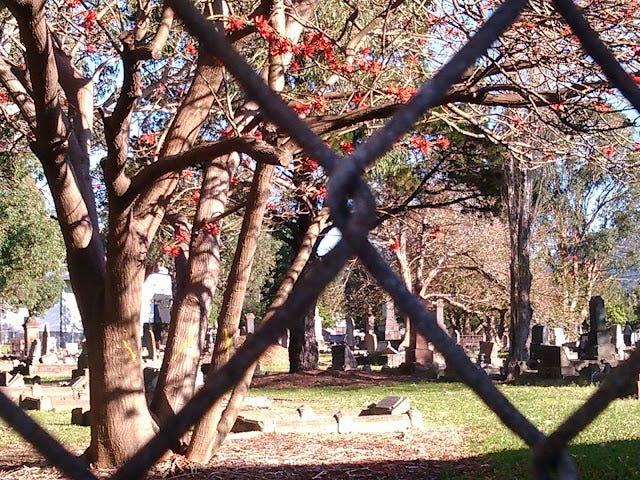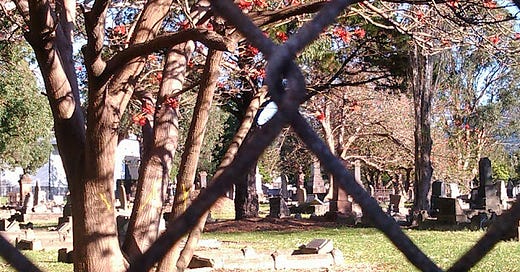
Coniston, NSW, Australia
Well, gorgeous strides, a brain in a continual state of obsession, a last laugh, a final echo, these things, the crow cries, the call of other names, a distant shiver in a dark place, all of it, reward for what? He didn't much care now what happened. Yes, he still dreamt of the same things in an endless loop. "Make fun of the falang, make fun of the falang." They just wouldn't leave him alone, the nasty parasites, the corrupt police. They stole from him at every opportunity, and thought it was funny. Haunted and without sleep, he made poor decisions. His drunken uncle said: They sell people drugs and then if the person bites, they come in and bust them, or get money off them. Yes, I know, he said. They're unbbelievably corrupt. And of course their government condoned it, backed them, and they swashbuckled, as if proud of their own power. If power to be absurd, to make a fool of yourself, was really power.
None of it mattered now, but his head remained frozen in a loop. Because he wouldn't be here if he hadn't been there. And that, perhaps, was the key to everything. That the hoola hoop would finally roll on out of the yard. That another turn, another place, would become part of the ravishing, That tired, unkind thoughts of nasty, vicious, unpleasant people would finally curl away into the shambles of other lives. He shuddered at what had happened, but couldn't rewrite history. Their own disregard for decency was already known. If the haunting had not gone on for so long; perhaps it would not linger still. A sharp intake of breath. A fetid bow. Love lost, a love that never was. They laughed. He shuddered. And perhaps it was always thus.
In the unbelievable circumstances, when every little shred of a former self cried inside, funnelled through to a present when he loudly declared: "I had a nervous breakdown. Do your worst, you bastards." And the sick seas of the crowds just escalated their howling, and he stared straight through them: because no escape was possible. They were everywhere, in every part of his life; and the damage they did, there was no compensation. They could say what they liked, he didn't care. There was a cemetery awaiting for them all, for the entire cast and crew, including him. Time would blink and they would all be gone. Marketing campaigns would pass across the land, and delusion remain paramount. But none of it meant salvation, or a better place. They would leave the earth, their country, a worse place.
And so when he came to it, to dealing with what had happened, he let his head go on in an eternal loop. An intoxicating beauty. The mumble of a distant television. Voices in the air which could have been radio waves; they were so muffled, so far away. Because time would cure everything, he already knew that. Time would cure everything, an ancient pass on a football field, a cruel distance in a solid land, a pass that should never have been. His spirit was everywhere now, on an ancient Greek field, in a modern Thailand, on a lonely Australian beach. He could feel them moving beyond the realm of sight, the others. He knew now why Mervyn Peake went mad at the end of his life. He knew now why village boys were nothing but thieves, why desire became so random with age, why crowds could be so easily manipulated. He knew now that there would be no peace, but there would be triumph. And he knew now that their faces had already changed; dust to dust, ashes to ashes, a brutal turning of the switch, and all was gone.
THE BIGGER STORY:
http://www.boston.com/ae/celebrity/2013/10/02/best-selling-author-tom-clancy-has-died-age/RsGU3JsQs6ZxsKSqAyzOUI/story.html
NEW YORK (AP) — Tom Clancy, whose high-tech, Cold War thrillers such as ‘‘The Hunt for Red October’’ and ‘‘Patriot Games’’ made him the most widely read and influential military novelist of his time, has died. He was 66.
Penguin Group (USA) announced that Clancy had died Tuesday in Baltimore. The publisher did not provide a cause of death.
Tall and thin, with round, sunken eyes that were often hidden by sunglasses, Clancy had said his dream had been simply to publish a book, hopefully a good one, so that he would be in the Library of Congress catalog. His dreams were answered many times over.
His novels were dependable best sellers, with his publisher estimating that worldwide sales top 100 million copies. Several, including ‘‘The Hunt for Red October,’’ ‘'Patriot Games’’ and ‘‘Clear and Present Danger,’’ were later made into blockbuster movies, with another based on his desk-jockey CIA hero, ‘‘Jack Ryan,’’ set for release on Christmas. Alec Baldwin, Ben Affleck and Harrison Ford were among the actors who played Ryan on screen.
A political conservative who once referred to Ronald Reagan as ‘‘my president,’’ Clancy broke through commercially during a tense period of the Cold War, and with the help of Reagan himself. In 1982, he began working on ‘‘The Hunt For Red October,’’ basing it on a real incident in November 1979, in which a Soviet missile frigate called the Storozhevoy attempted to defect. He sold the manuscript to the first publisher he tried, the Naval Institute Press, which had never bought original fiction.
In real life, the ship didn’t make it, but in Clancy’s book, published in 1984, the defection was a success. Someone thought enough of the book to give it to President Reagan as a Christmas gift. The president quipped at a dinner that he was losing sleep because he couldn’t put the book down — a statement Clancy later said helped put him on the New York Times best-seller list.
Clancy was admired in the military community, and appeared — though he often denied it — to have the kind of access that enabled him to intricately describe anything from surveillance to the operations of a submarine. He often played off — and sometimes anticipated — world events, as in the pre-9/11 paranoid thriller ‘‘Debt of Honor,’’ in which a jumbo jet destroys the U.S. Capitol during a joint meeting of Congress.
Earning million-dollar advances for his novels, he also wrote nonfiction works on the military and even ventured into video games, including the best-selling ‘‘Tom Clancy’s Ghost Recon: Future Soldier,’’ ‘'Tom Clancy’s Splinter Cell: Conviction’’ and ‘‘Tom Clancy’s Splinter Cell: Double Agent.’’ His recent Jack Ryan novels were collaborations with Mark Greaney, including ‘‘Threat Vector’’ and a release scheduled for December, ‘‘Command Authority.’’
http://www.boston.com/ae/celebrity/2013/10/02/best-selling-author-tom-clancy-has-died-age/RsGU3JsQs6ZxsKSqAyzOUI/story.html
Australian Prime Minister Tony Abbott has described the relationship with New Zealand as "like family" after a meeting with John Key today.
The New Zealand Prime Minister touched down in Canberra this evening, the first foreign leader to meet the new Australian Prime Minister Tony Abbott on home soil.
"New Zealand is family in a way that probably no other country on earth is," Abbott said after the leaders met.
ONE News political editor Corin Dann, travelling with Mr Key, says it is a very important meeting for Mr Key "because it is that first chance to really strike up some chemistry with Tony Abbott as Prime Minister and to see how he is going to operate in that role".
Mr Key says it's important the two leaders develop a chemistry and therefore regular contact.
"This is a tremendously important relationship from New Zealand a perspective, no relationship is more important," he said.
Abbott said he would accept an invitation to come to New Zealand next year.
Kiwis in Australia
New Zealanders in Australia ineligible for welfare benefits look unlikely to receive fairer treatment anytime soon, with Prime Minister Tony Abbott saying he's happy with the situation.
There are 300,000 Kiwis on special category visas in Australia, paying billions in taxes but denied key benefits of permanent residency, such as disability care, welfare and social housing.
Australians living in New Zealand receive all the entitlements of citizens.



